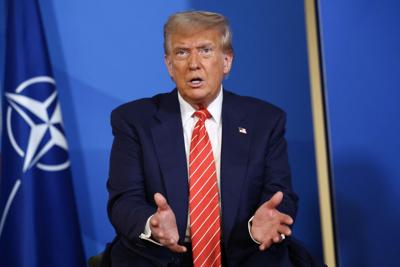An American intervention likened to the atomic bombs dropped on Japan in World War II has set back IranÔÇÖs nuclear program by ÔÇťdecades,ÔÇŁ U.S. President Donald Trump claims.
Speaking at a gathering of NATO leaders in The Hague, Trump disputed reports that the bunker buster bombs dropped by American war planes during the Israel-Iran war had failed to completely destroy the Iranian nuclear facilities.
CNN, which on the confidential Pentagon assessment, said that the attacks had delayed IranÔÇÖs nuclear production efforts by just a few months.
The report contradicts statements from U.S. President Donald Trump and Israeli Prime Minister Benjamin Netanyahu about the status of Iran’s
The report contradicts statements from U.S. President Donald Trump and Israeli Prime Minister Benjamin Netanyahu about the status of Iran’s
Describing as ÔÇťscumÔÇŁ those journalists who reported on the assessment that there had been only limited damage to IranÔÇÖs nuclear program, Trump said that the intelligence was ÔÇťvery inconclusiveÔÇŁ and concluded that the damage ÔÇťcould have been very severe.ÔÇŁ
Saying that there had since been additional intelligence reports as well as physical visits, he insisted Wednesday that IranÔÇÖs nuclear ambitions had instead been set back by ÔÇťbasically decades.ÔÇŁ
ÔÇťThey just went through hell. I think theyÔÇÖve had it. The last thing they want to do is enrich,ÔÇŁ he said, adding that the American bomb strike ÔÇťended the war.ÔÇŁ
ÔÇťI donÔÇÖt want to use an example of Hiroshima, I donÔÇÖt want to use an example of Nagasaki, but that was essentially the same thing. That ended that war. This ended the (Israeli-Iran) war. If we didnÔÇÖt take that out, theyÔÇÖd be fighting right now.ÔÇŁ
Iran has enriched uranium to 60 per cent purity, just short of the 90 per cent required to make a nuclear weapon. About 400 kilograms of that highly enriched uranium is currently unaccounted for, according to the International Atomic Energy Agency.
Trump said that American officials would be meeting with the Iranians next week, but brushed off the notion that Iran would try to restart its nuclear program or that he wanted a new formal deal to limit the country’s atomic ambitions.
Asked if he would order more strikes on Iranian nuclear facilities if nuclear enrichment activities continued or resumed, Trump said: ÔÇťSure, but IÔÇÖm not going to have to worry about that.ÔÇŁ
ÔÇťItÔÇÖs gone for years, years. ItÔÇÖs very tough to rebuild because the whole thing has collapsed. In other words, inside itÔÇÖs all collapsed. Nobody can get in to see it because itÔÇÖs collapsed. You canÔÇÖt go in to see a room thatÔÇÖs got 10 million tonnes of rock in it.ÔÇŁ
Israeli Prime Minister Benjamin Netanyahu said Tuesday that his countryÔÇÖs military efforts had sent IranÔÇÖs nuclear program ÔÇťdown the drain.ÔÇŁ
There were more modest impact assessments from the IAEA, which monitors nuclear facilities programs around the world.
On Tuesday, Director-General Rafael Mariano Grossi that there has been ÔÇťextensive damage at several nuclear sites in IranÔÇŁ as well as ÔÇťsome localized radioactive as well as chemical release inside the affected facilities that contained nuclear material.ÔÇŁ
But he said there has been no reports of increased radiation levels outside of the nuclear facilities.
Grossi said the Fordow nuclear site, which was build deep underground, beneath a mountain, has likely suffered damage to access roads close to the facility and at one of its entrances.
The strikes to the Natanz nuclear facility, used to enrichment activities and storage of enriched uranium, ÔÇťmay have caused localized contamination and chemical hazards.ÔÇŁ
IranÔÇÖs Parliament voted Wednesday to suspend nuclear safety co-operation with the IAEA, though a formal decision to cut ties has not yet been taken.
In a June 22 statement in response to the U.S. attacks, the head of the Atomic Energy Agency of Iran, Mohammad Reza Kardan, said that officials had anticipated attacks on its nuclear facilities and taken defensive measures.
ÔÇťDue to the previously planned measures and the measures taken, no radiation contamination or nuclear radiation has been observed outside these sites and facilities.ÔÇŁ
Trump provided no details on negotiations between Israel and Iran that might result in a longer-term peace deal between the bitter enemies, but he suggested that the American strikes on Iran had resulted in ÔÇťgreat progress being made on Gaza.ÔÇŁ
ÔÇťBecause of this attack that we made, I think weÔÇÖre going to have some very good news.ÔÇŁ
Israel is still seeking the return of hostages taken by Hamas in the attack of Oct. 7, 2023. United Nations officials are managing a humanitarian catastrophe affecting Palestinians in the Gaza Strip.
Earlier this week, in a briefing for journalists, the head of the UN Office for the Coordination of Humanitarian Affairs, Jonathan Whitall, said that more than 400 Palestinians have been killed, most of them ÔÇťshot or shelled trying to reach U.S.-Israeli distribution sites purposefully set up in militarized zones.ÔÇŁ
ÔÇťJust a few days ago more than 60 people were killed and hundreds injured when a tank opened fire on a crowd of people waiting for food trucks to arrive,ÔÇŁ he said. ÔÇťIt shouldnÔÇÖt be this way. There shouldnÔÇÖt be a death-toll associated with accessing the essentials for life.ÔÇŁ

























